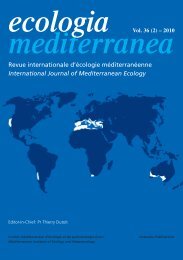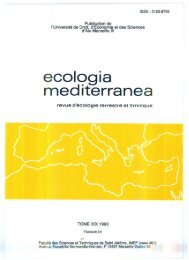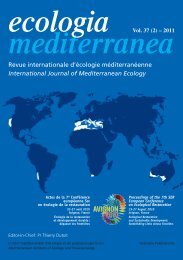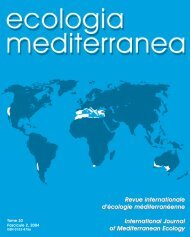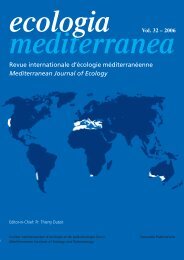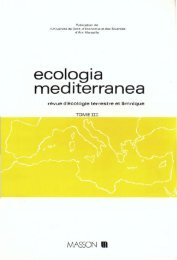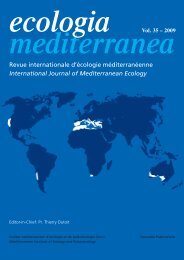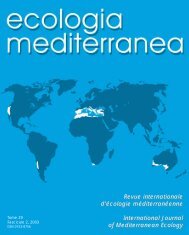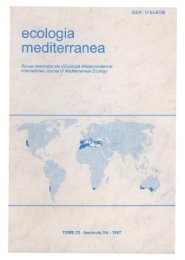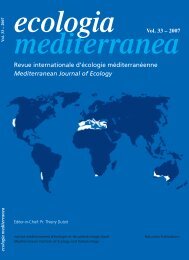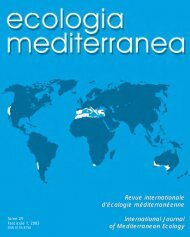Revue internationale d'écologie méditerranéenne International ...
Revue internationale d'écologie méditerranéenne International ...
Revue internationale d'écologie méditerranéenne International ...
You also want an ePaper? Increase the reach of your titles
YUMPU automatically turns print PDFs into web optimized ePapers that Google loves.
A. DJABEUR, M. KAID-HARCHE, D. CÔME, F. CORBINEAU<br />
90<br />
milieu à – 1MPa. L’élimination de la dormance<br />
par une conservation au sec de 12 mois à la température<br />
ambiante entraîne un élargissement de<br />
la gamme de températures permettant une germination<br />
rapide. Cependant, l’optimum thermique<br />
reste similaire à celui des semences fraîchement<br />
récoltées, c’est-à-dire 20-25 o C. La<br />
dormance résulte principalement des enveloppes,<br />
mais le caryopse nu joue aussi un rôle<br />
dans la photosensibilité des semences entières.<br />
L’intensité de la dormance dépend du lieu de<br />
récolte ; elle est plus profonde pour les semences<br />
récoltées dans la zone semi-aride (cytotype polyploïde,<br />
2n = 40) que pour celles collectées sur les<br />
hauts plateaux arides (cytotype diploïde, 2n<br />
= 16). Le rôle écologique de la dormance et de<br />
la post-maturation au sec est discuté en relation<br />
avec l’établissement de cette espèce dans un<br />
environnement aride.<br />
Introduction<br />
Lygeum spartum L. (Poaceae), commonly<br />
named esparto, is an important perennial grass<br />
in semi-arid and arid areas in Algeria (Aimé<br />
1988; Le Houérou 1995). With Stipa tenacissima<br />
L. and Aristida pungens Desf. this grass<br />
makes a natural fence against desert expansion.<br />
In addition to its ecological role, Lygeum<br />
spartum has an economical interest in traditional<br />
craftsmen and paper manufacturing<br />
(Harche et al. 1991). For local purposes it is<br />
then important to try to maintain the natural<br />
populations of this plant and to increase their<br />
regeneration potential. However, although<br />
numerous works have been devoted to the<br />
germinaton of seeds of various annual and<br />
perennial desert plants (Baskin & Baskin<br />
1998; Gutterman 2002), to our knowledge<br />
only few studies (Conesa et al. 2007; 2009)<br />
have been performed on the suitability of<br />
Lygeum spartum for phytostabilisation of acid<br />
mine tailings but no study has been carried<br />
out in order to determine the main environmental<br />
factors regulating the seed germination<br />
in this plant.<br />
Seed germination is subjected to a very precise<br />
regulation, the complexity of which originates<br />
both in the action of various external<br />
factors and in the seeds themselves (Bewley<br />
& Black 1982; Côme & Corbineau 1998).<br />
Water, oxygen and temperature are the three<br />
essential factors in germination, but light may<br />
also play a role in many seeds (Bewley &<br />
Black 1982; Côme & Corbineau 1998). However,<br />
seeds are often unable to germinate, or<br />
do so with great difficulty, even placed in conditions<br />
that are apparently favourable for ger-<br />
mination (good supply of water, good oxygenation,<br />
apparently good temperature); they<br />
are considered as dormant (Bewley & Black<br />
1982; Côme & Corbineau 1998). Seed dormancies<br />
do not correspond to a complete<br />
inability to germinate, they are generally relative<br />
phenomena the expression of which<br />
depends on external factors (Bewley & Black<br />
1982; Côme 1982; Côme & Corbineau,<br />
1998). They should be viewed as systems for<br />
regulating germination and ensuring the survival<br />
of wild species by extending the timerange<br />
over which germination occurs, or by<br />
allowing germination only at certain times of<br />
the year (Bewley & Black 1982; Baskin &<br />
Baskin 1998; Gutterman 2002). Although<br />
dormancy depends first on the seed genotype,<br />
it is well known that it can be largely modulated<br />
by the environmental factors in which<br />
the mother plants are developing, such as<br />
daylength (Evenari et al. 1966; Kigel et al.<br />
1977; Gutterman 1985) and temperature<br />
(Datta et al. 1972; Do Cao et al. 1978).<br />
Dormancy of grass and cereal seeds is known<br />
to be progressively lost during their storage in<br />
the dry state under ambient conditions (Bewley<br />
& Black 1982; Simpson 1990; Côme &<br />
Corbineau 1998). This breaking of dormancy,<br />
usually termed after-ripening, is expressed by<br />
a widening of the temperature range within<br />
which good germination occurs (Côme et al.<br />
1984; Simpson 1990). When they are no more<br />
dormant, these seeds are also less sensitive to<br />
oxygen deprivation and light than before<br />
breaking of their dormancy (Simpson 1990;<br />
Corbineau & Côme 1996). In wild grasses<br />
from semi-arid and arid areas, dormancy is<br />
lost during the dry season, and then caryopses<br />
become capable of germinating by the following<br />
winter or spring rains (Gutterman et<br />
al. 1996; Baskin & Baskin 1998).<br />
The aims of the present work were (i) to<br />
determine the main characteristics and the origin<br />
of dormancy of two cytotypes of Lygeum<br />
spartum seeds collected in two different geographic<br />
regions in Algeria, a littoral semi-arid<br />
zone (polyploid cytotype, 2n = 40) and an arid<br />
zone (diploid cytotype, 2n = 16) (Benmansour<br />
& Kaid-Harche 2001; Djabeur et al. 2008),<br />
(ii) to investigate the effects of temperature,<br />
white light and water potential of the medium<br />
on the germination of freshly harvested seeds,<br />
and (iii) to study whether dormancy is broken<br />
in dry seeds, in order to improve our grasp of<br />
the establishment of the species under natural<br />
conditions.<br />
ecologia mediterranea – Vol. 36 (1) – 2010



